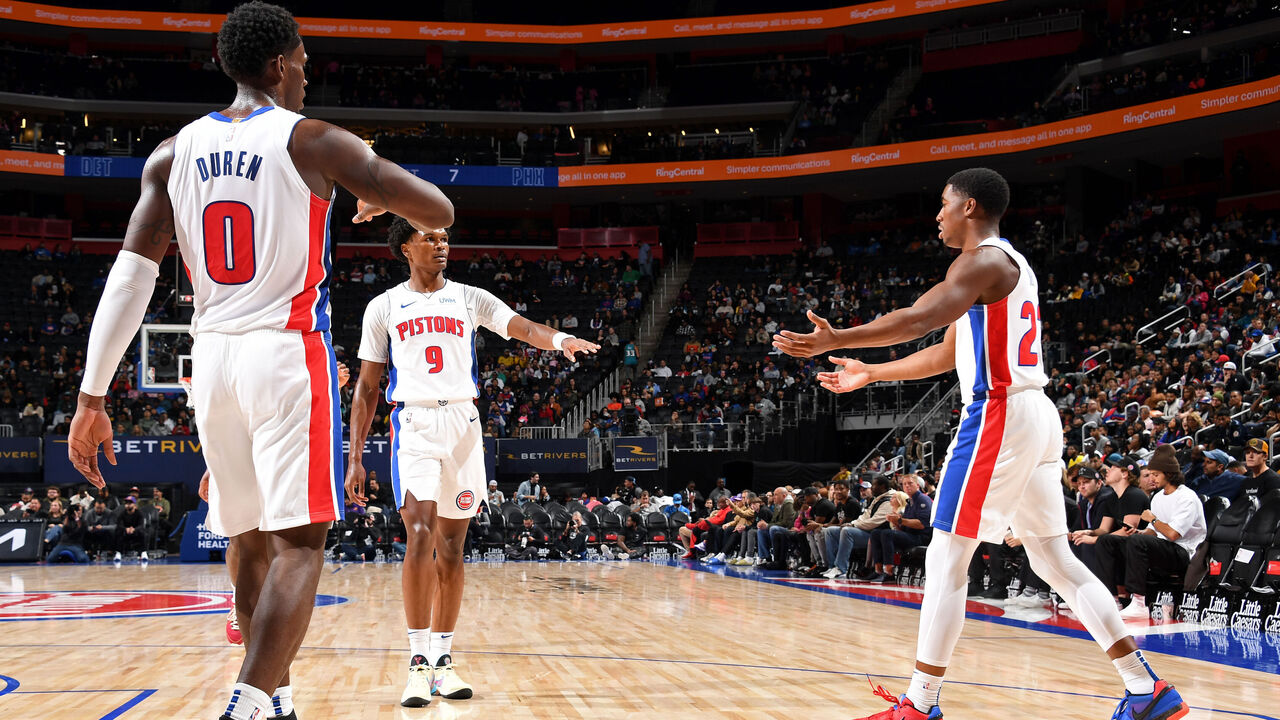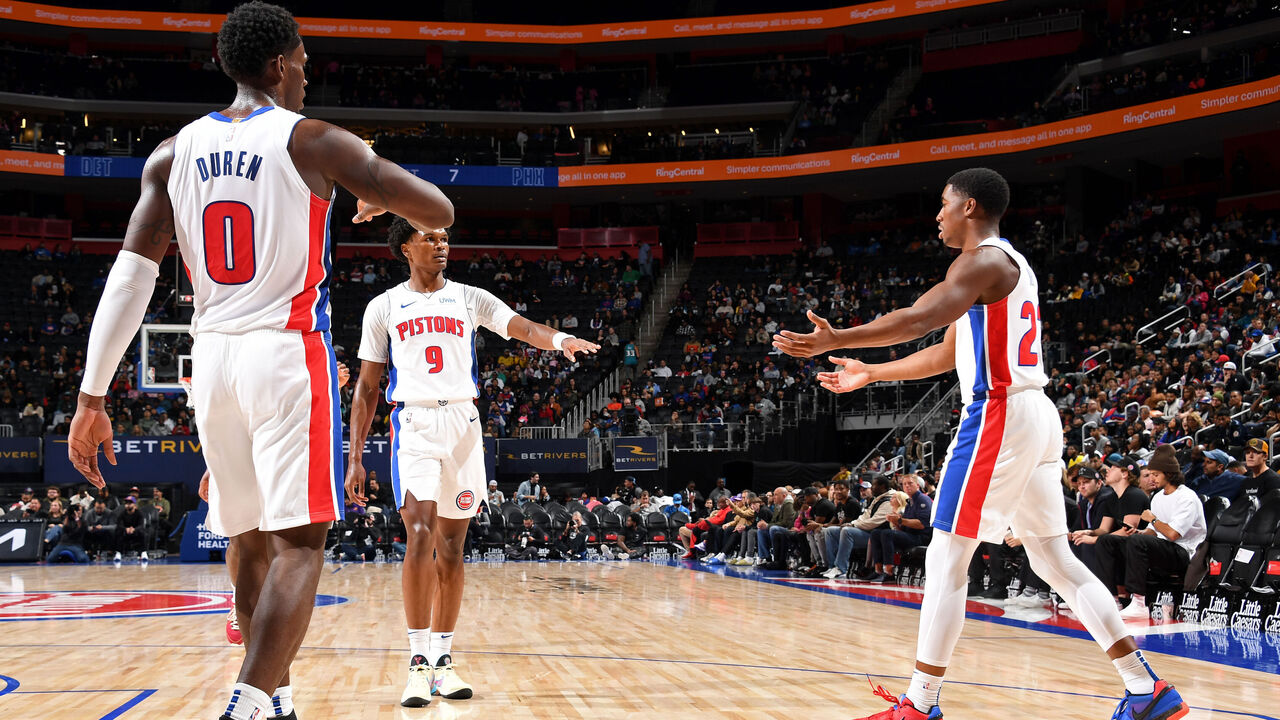Motown blues: In Cunningham's 3rd season, Pistons' rebuild is stuck in mud
Even for the NBA’s annual crop of cellar dwellers and general pretenders, the beginning of a new season is supposed to bring renewed hope, at least for a little while.
The Detroit Pistons didn’t get the memo.
Detroit didn’t need to be any measure of good this season. It didn’t need to make any sort of play-in leap, or even embark on an inspiring inaugural in-season tourney run. But fans understandably expected the team to take some baby steps forward after a league-worst 17-win campaign.
This is an organization five years removed from recording 30 wins or making the playoffs, eight years removed from its last winning season, and one that’s made the postseason twice over the last 14 years. The Pistons haven’t won a playoff game since 2008. Jalen Duren, the team’s current starting center, was 4 years old when Detroit won Game 4 of the 2008 Eastern Conference finals.
The Pistons have spent much of that time since wandering the wilderness of NBA mediocrity; nowhere near good enough to compete, but not quite bad enough for the top of the draft lottery. That changed upon the team’s hiring of former Thunder executive Troy Weaver in 2020, a move that finally precipitated a full-scale rebuild.
Weaver’s Pistons have accumulated a ton of youngsters during his tenure thanks to their on-court performance (a 60-176 record between the 2020-21 and 2022-23 seasons) and a number of trades. By the time this season tipped off, Detroit had eight players on its roster who were selected in the first round of the last four drafts.

What the young Pistons are now learning is that it’s virtually impossible to adequately develop and optimize that many prospects at once.
They traded Saddiq Bey – a productive youngster perfectly suited to be a role player on competitive teams – to take a flier on James Wiseman a year after taking a flier on Marvin Bagley III. Both big men are now vying for minutes in the same frontcourt as Duren and Isaiah Stewart. Killian Hayes has been blocking Jaden Ivey’s playing time and development, and they both have to share a backcourt with rookie sharpshooter Marcus Sasser, who was recently playing less than Kevin Knox for some reason.
It’s one thing for rebuilding teams to balance future development with short-term competitiveness, but that’s not the case here. The Pistons continue to embarrass themselves on the court while young players get lost in the shuffle and their trade value deteriorates.
After an encouraging opening week saw Detroit win two of its first three games, the Pistons have dropped 12 straight, once again sinking to the NBA’s abyss. Recent losses have been particularly disheartening: Following a 29-point loss in Toronto last Sunday, the Pistons fell at home to a Jamal Murray-less Nuggets squad that also lost Nikola Jokic and head coach Michael Malone to first-half ejections. Adding insult to injury, a pair of former Pistons sunk them.
Remarkably, this marks Detroit’s third losing streak of at least 11 games over the team’s last 40 contests dating back to last season, a stretch that’s seen the Pistons go 4-36. The city’s football team has more wins in 2023 despite playing 45 fewer games.
To be fair, the Pistons have already lost more games to injury than any other team this season, with veterans Bojan Bogdanovic and Joe Harris spending most of the young season on the sidelines. The continued absence of those shooters and the recent loss of Duren’s vertical spacing has cramped Detroit’s offense and made it difficult for the team’s young ball-handlers to operate.
No one’s paid the price for this lack of spacing more than Cade Cunningham, the crown jewel of the Pistons’ rebuild. But excuses are also running out for 2021’s No. 1 overall pick.
Injuries limited Cunningham’s playing time and development over his first two seasons. The offensive environment around the 22-year-old is far from ideal, and new head coach Monty Williams’ ($12 million per year) system has so far looked unimaginative. But the Pistons should want more from their supposed franchise player.
Cunningham’s numbers are encouraging enough (21.4 points and 7.3 assists per game), but underlying metrics and the eye test paint a more disturbing picture. For a player his size (6-foot-6) who has the ball as often as he does, Cunningham’s offensive impact doesn’t add up. He gets to the rim and draws fouls at decent clips, but he doesn’t do either at an elite enough level to overcome his shooting and playmaking limitations.
The third-year player is in the 13th percentile among wings when it comes to finishing at the rim, the 46th percentile as a mid-range shooter, and the 21st percentile from deep, according to Cleaning The Glass. He’s also had trouble with double-teams and generally turns the ball over too often.
Some of that can be attributed to his youth and environment, but watch even a quarter of a Pistons game and you’re likely to witness an unforced Cunningham turnover that can’t be explained by poor spacing. Cunningham owns the highest turnover rate among 20 players with usage rates above 30% this season, coughing the ball up on more than 18% of his possessions.
On the other end, Cunningham’s defensive impact and effort have waned. Opposing players routinely blow by him, while his steal, block, and rebound rates have plummeted.
Say what you will about the bad breaks the Pistons have encountered and the overall promise of the team’s youth movement – Ausar Thompson is light-years ahead of average rookies defensively, Duren looked great to start the season, Ivey has his moments, and Sasser can definitely shoot – but their future is in Cunningham’s hands. If he doesn’t become the superstar the franchise envisioned, the Pistons’ protracted rebuild will have been a soul-crushing waste of time for already long-suffering fans.
When rival owners reportedly urged the league to save the 76ers from former GM Sam Hinkie’s “Process” in 2015-16, Philadelphia was a 1-20 train wreck in Year 3 of a painful rebuild. But franchise savior Joel Embiid and future All-Star Ben Simmons were yet to play a single game. Philly ended up missing the playoffs in five consecutive seasons, but a 54-loss Sixers team in 2016-17 went a more respectable 13-18 in the first 31 games of Embiid’s career and returned to the postseason the following year when Simmons debuted alongside Embiid.
Comparing Cunningham to the reigning MVP might be wildly unfair, but when a 2021 lottery victory temporarily restored hope to Detroit basketball, it was because the Pistons (and many others) projected Cunningham as a game-changer; the rare breed of star who allows a team the luxury of figuring out the rest of the equation later. Ninety-one games into his career, how often does Cunningham still make Pistons fans feel that way?
The organization certainly bears some responsibility here. At least Hinkie was still trying to lose when he was undercut and essentially forced out in Philly. What’s Weaver’s excuse? Still, Cunningham needs to prove he’s capable of impacting winning and lifting his team out of NBA poverty.
For now, Detroit appears as far from relevance and contention as it was when this rebuild began. Here’s hoping 2024 brings brighter days to Motor City basketball fans than 2023 did. Or 2022. Or 2021. Or 2020. Or … you get the picture.
Joseph Casciaro is theScore’s senior content producer.


